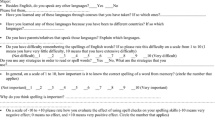Abstract
To what extent does phonology play a role in spelling English words? The written responses of deaf students and groups of hearing children to five tasks were subjected to quantitative and qualitative analyses. The first three tasks were used to see if deaf students utilized phonology when they generated their own words and to compare their spelling performance with that of hearing subjects. The fourth and fifth tasks were designed to compare the spelling performance of deaf and hearing subjects when they were required to reproduce visually presented common words. Results showed that deaf students, who were chronologically much older, were not better spellers than hearing children from the fifth grade. Analysis of data revealed little evidence that the deaf students involved in the present study utilize phonology in spelling. Nor did word-specific visual memory for entire words appears to play a role in spelling by deaf students. Rote visual memory for letter patterns and sequences of letters within words, however, appears to play a role in the spelling by deaf students. It is concluded that sensitivity to the stochastic-dependent probabilities of letter sequences may aid spelling up to certain point but phonology is essential for spelling words whose structure is morphophonemically complex.
Similar content being viewed by others
References
Aaron, P.G. & Joshi, M. (1992). Reading problems: Consultation and remediation. New York: The Guilford Press.
Beech, J.R. & Harris, M. (1992). The prelingually deaf young reader: A case of logographic reading? Cited in M. Marschark, Psychological development of deaf children. New York: Oxford University Press.
Bruck, M. (1987). The adult outcomes of children with learning disabilities, Annals of Dyslexia 37: 252-263.
Campbell, R. (1994). Spelling in prelingual deafness. In G.D. Brown & N.C. Ellis (eds.), Handbook of spelling: Theory, process and intervention (pp. 249-259). New York: John Wiley.
Campbell, R., Burden, V. & Wright, H. (1992) Spelling and speaking in prelingual deafness: Isolated alphabetic spelling skills. In C. M. Sterling & C Robson (eds.), Psychology, spelling and education (pp. 185-200). Philadelphia, PA: Multilingual Matters Ltd.
Chen, K. (1976). Acoustic image in visual detection for deaf and hearing college students, Journal of General Psychology 94: 243-246.
Conrad, R. (1970). Short-term memory in the deaf, British Journal of Psychology 63: 179-195.
Dodd, B. (1980). The spelling abilities of profoundly pre-lingually deaf children. In U. Frith (ed.), Cognitive processes in spelling (pp. 423-440). New York: Academic Press.
Finucci, J., Gottfredson, L.S. & Childs, B. (1985). A follow-up study of dyslexic boys, Annals of Dyslexia 35: 117-136.
Frauenheim, J.G. & Heckerl, J.R. (1983). A longitudinal study of psychological and achievement test performance in severe dyslexic adults, Journal of Learning Disabilities 16: 339-347.
Gates, A.I. & Chase, E.H. (1926). Methods and theories of learning to spell tested by studies of deaf children, Journal of Educational Psychology 17: 289-300.
Gibson, E.J. & Levin, H. (1973). The psychology of reading. Cambridge, MA: The MIT Press.
Hanson, V.A. (1989). Phonology and reading: Evidence from profoundly deaf readers. In D. Shankweiler & I.Y. Liberman (eds.), Phonology and reading disability: Solving the reading puzzle (pp. 69-90). Ann Arbor, MI: The University of Michgan Press.
Hanson, V.A., Shankweiler, D. & Fischer, F.W. (1983). Determinants of spelling ability in deaf and hearing adults: Access to linguistic structure, Cognition 14: 323-344.
Hanson, V.A. & Fowler, C.A. (1987). Phonological coding in word reading: Evidence from hearing and deaf readers, Memory & Cognition 15: 199-207.
Hanson, V.A. & McGarr, N.S. (1989). Rhyme generation by deaf adults, Journal of Speech and Hearing Research 32: 2-11.
Hanson, V.A., Goodell, E.W. & Perfetti, C. (1991). Tongue-twister effects in the silent reading of hearing and deaf college students, Journal of Memory and Language 30: 319-330.
Henderson, L. (1984). Writing systems and reading processes. In: L. Henderson (ed.), Orthographies and reading (pp. 1-3). Hilsdale, NJ: Erlbaum.
Hoeman, H.W., Andrews, E.C., Florian, V.A., Hoeman, S.A. & Jensema, C. (1976). The spelling proficiency of deaf children, American Annals of the Deaf 25: 489-493.
Kreiner, D.S. & Gough, P.B. (1990). Two ideas about spelling: rules and word-specific memory, Journal of Memory and Language 29: 103-118.
Peters, M.L. (1992). Towards spelling autonomy. In C.M. Sterling & C. Robson (eds.), Psychology, spelling and education (pp. 220-224). Philadelphia, PA: Multilingual Matters Ltd.
Treiman, R. (1993). Beginning to spell. New York: Oxford University Press.
Venezky, R. (1967). English orthography: Its graphical structure and its relation to sound, Reading Research Quarterly 2: 75-105.
Waters, G. & Doehring, D.G. (1990). The nature and role of phonological information in reading acquisition: Insights from congenitally deaf children who communicate orally. In T. Carr & B.A. Levy (eds), Reading and its development: Component skills approach (pp. 220-232). New York: Academic Press.
Author information
Authors and Affiliations
Rights and permissions
About this article
Cite this article
Aaron, P.G., Keetay, V., Boyd, M. et al. Spelling without phonology: A study of deaf and hearing children. Reading and Writing 10, 1–22 (1998). https://doi.org/10.1023/A:1007917929226
Issue Date:
DOI: https://doi.org/10.1023/A:1007917929226



